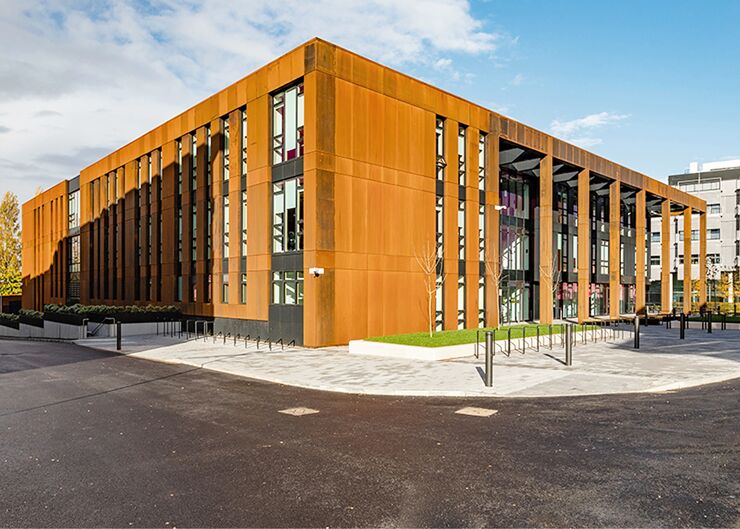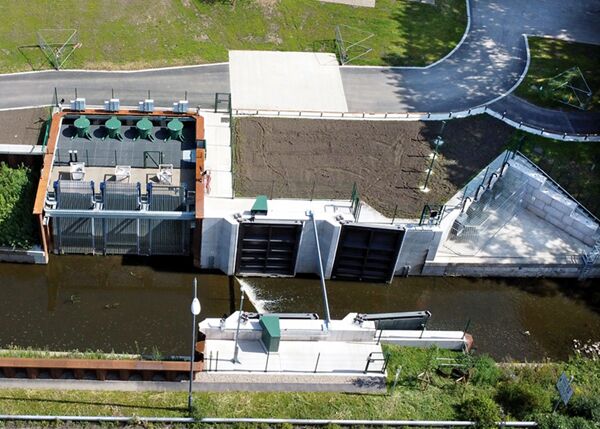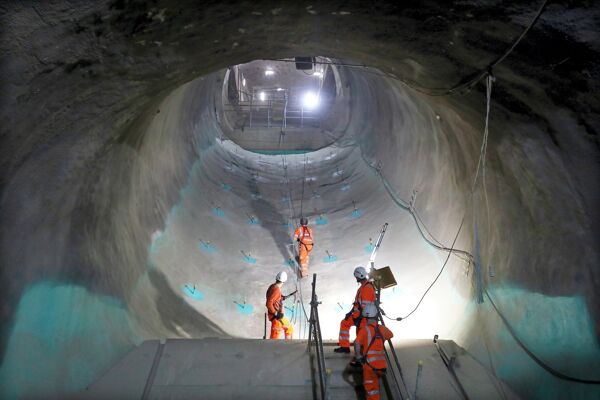
NEC has been used to deliver a world-class teaching and research building at a major UK university. The University of the West of England (UWE) let construction of its new state-of-the-art Engineering Building in Bristol to Bam Construction under a £27 million NEC4 Engineering and Construction Contract (ECC) Option A (priced contract with activity schedule) in September 2018.
The four floors of the 8500 m2 steel-framed, Corten-clad building are arranged around a full-height atrium finished with a glulam timber roof structure. With a capacity for 1600 students and 100 staff, the building provides flexible learning and research spaces, workshops and laboratories plus specialist engineering facilities such as engine test cells, a rolling road and simulation areas.
Sustainability features include rainwater collection, solar panels, district heating, natural ventilation and passive cooling, all of which helped to achieve a Breeam excellent rating. Designed as a ‘smart building’, room environments are individually controlled through a building management system, which monitors carbon dioxide levels and opens windows and louvre vents automatically.
NEC project manager Capita, architect AHR, consulting engineer Hydrock and cost consultant Mace were each engaged under an NEC4 Professional Service Contract (PSC). Despite 3 months delay due to the Covid-19 pandemic, the project was completed on budget and in time for the start of the new academic year in early October 2020. It won Project of the Year and Social Infrastructure Project of the Year in the 2021 British Construction Industry Awards.
Fixed price
The University of West of England is an experienced NEC user, having procured several other campus projects through the contract suite. University project manager Stephen Denning says, ‘The key reasons for choosing NEC4 ECC Option A for this scheme was the reassurance of having fixed price for a relatively complex, high-value building. Option A allowed the University to know the costs from the start, subject to any client changes.’
He says it was also critical for the building to be completed in time for the start of the 2020−21 academic year. ‘The NEC requirement for a regularly updated programme enabled the project manager to closely monitor the programme, activity schedule and progress, which also helped with cost management.’
Denning says the NEC obligation to, ‘act in a spirit of mutual trust and co-operation’ encouraged full collaboration across the project team. ‘From the outset, the client, designers and contractor worked in full co-operation, developing the design through a collaborative two-stage tender process. The key to this success was the trust and free flow of ideas, enabling full realisation of the University’s vision in the finished project.’
He says all design decisions were taken as a team. ‘The contractor involved key supply chain partners at the earliest opportunity to advise on buildability, interfaces and the effect on programme. A project room was set up on campus as a drop‐in space for consultation, where the combined project team worked, allowing faculty staff members to drop in as their timetable allowed to consult and appraise design development and on-site progress.’
Denning adds that NEC processes proved to be a highly effective way to manage and agree changes prior to handover. ‘Frequent NEC early warning meetings enabled us to work collaboratively through all issues that arose during construction so they could be closed out before completion. The NEC compensation event process also focused the team on managing and agreeing change within the contractual timescales.’
Covid mitigation
He says NEC-inspired collaboration proved critical when constructing during the Covid-19 pandemic and first national lockdown in 2020. ‘The contractor engaged fully with the University, the supply chain and stakeholders to develop mitigation measures, ensuring the building would still open for the start of the 2020 academic year as planned.’
‘Welfare provision was doubled to allow for strict social distancing, communications with all supply chain principals were carried out by Teams or Zoom, and additional bio-security measures were introduced along with a one-way system to encourage distancing.’
Denning says collaboration also extended to the local community, helping to ensure maximum social value for the project. ‘The contractor conducted 47 site visits for over 600 local students and groups, provided nearly 100 apprenticeship weeks, created permanent jobs for six long-term unemployed people and filled an additional ten positions. The team managed 90 weeks of work experience training and saw 20 NVQ completions for local supply chain partners. Finally, over half of the project spend went to supply chain partners based within a 50 km radius of site.’
Benefits of using NEC
- NEC4 ECC Option A provided the client with the reassurance of a fixed price for a relatively complex, high-value project.
- NEC requirement for a regularly updated programme helped to ensure the critical opening date for students was achieved.
- NEC obligation to, ‘act in a spirit of mutual trust and co-operation’ encouraged full collaboration across the project team.
- NEC early warning meetings enabled the project team to work collaboratively through all issues that arose during construction so they could be closed out before completion.
- NEC compensation event process focused the team on managing and agreeing change within contractual timescales.



